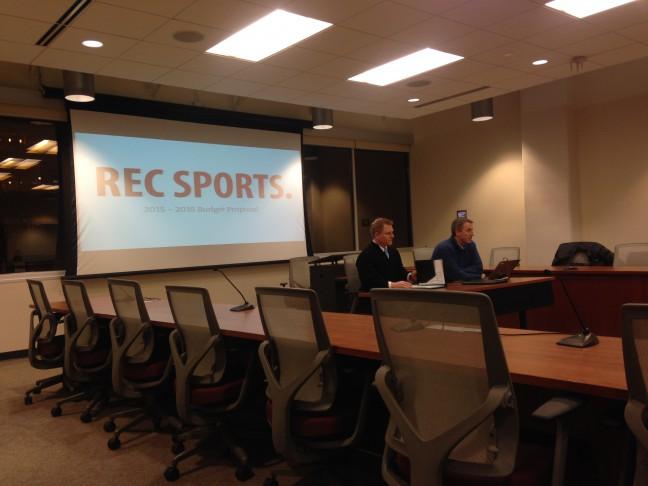The Student Services Finance Committee approved the University Health Services 2015-16 budget and heard a budget proposal from Recreational Sports in a Monday meeting.
SSFC approved the UHS 2015-16 budget of $12,576,671 with a vote of 13-0-1 and heard a budget proposal from Recreational Sports which could include an increase in student segregated fees.
UHS provides medical and mental health services to students while improving the health of campus through prevention and public health.
In the past three budget cycles UHS has not asked for a segregated fee increase and this year there is a 5 percent decrease. UHS currently has $8,361,020 in cash reserves and they are decreasing their segregated fees to spend their cash reserves.
https://badgerherald.com/news/2015/02/10/ssfc-hears-uhs-budget-proposal/#.VOK9H0KJnzI
SSFC Rep. Colin Barushok said he was open to debate about elongating the time period over which the 5 percent decrease took place.
SSFC Rep. Sam Domach said he did not think UHS should prolong the decrease because “dragging it along doesn’t set a date that they need to have something figured out by.”
UHS wants to give the segregated fees back to the students who had to pay for the increase in the first place, SSFC Rep. Dylan Fiedler said. The students who are here now payed for the segregated fee increase and they would benefit by having a 5 percent segregated fee decrease.
The Rec Sports budget of $3,296,191 was proposed at the Monday meeting by John Horn, director of Rec Sports, and Mike Warren, senior associate director of Rec Sports.
This is an increase from the 2014-15 budget of $3,291,900. This takes into account an increase in enrollment and will not increase for individual students. Segregated fees fund 60 percent of the Rec Sports revenue and 23 percent is self-generated.
Rec Sports provides programs, services and facilities that promote the social, mental and physical well-being of the campus community.
Last year Rec Sports passed its Master Plan, which is proposed to take eight to 10 years. It was the largest referendum in UW’s history, Horn said. The Master Plan is on schedule at this point, he said.
The 2014-15 segregated fees for Rec Sports were $42.70 per student per semester, which is the lowest for schools in the Big Ten, Horn said. On average, Big Ten school’s segregated fees are $164.18, he said.
The proposed budget has no flexibility for unseen maintenance issues, Horn said.
“This budget forecasts a smooth year from a maintenance standpoint,” he said. “If something unexpected comes forward we’ll have to pull from somewhere else.”
The proposed budget does not allow for Rec Sports facilities to open at 6 a.m., which has been requested by students across campus, Horn said. Rec Sports also cannot compete with student wages across campus because of budget constraints this year, he said. There is not enough revenue to fund new initiatives or programs, he said.
SSFC Vice Chair Thuy Pham questioned whether Rec Sports would have difficulties maintaining the same quality workout facilities for students with the proposed budget.
Horn said if Rec Sports stays on schedule for the Master Plan, the type of service and quality students are getting this year is what they can expect in the future.
“Bad facilities don’t justify poor programs,” Horn said.
SSFC Chair Devon Maier asked what kind of message it would send to students if segregated fees were increased to pay for the Master Plan, even though they were assured they wouldn’t be.
Horn said it was never guaranteed and it was never a mandate. Rec Sports will stay committed to the segregated fee not increasing, although it does affect quality, he said.
“It is uncomfortable but our division is vital,” Horn said.
Maier said in his chair report that he is going to recommend a $5 to $7 increase in segregated fees per student at the Thursday meeting, when the Rec Sports budget will be finalized.
Because UHS has a segregated fee decrease in its budget, the overall burden on students would be relatively similar, Maier said.


